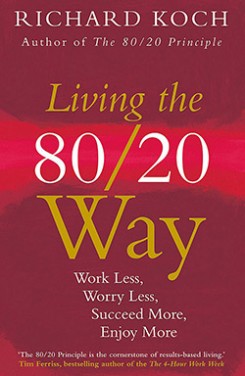Living the 80-20 Way
- Author: Richard Koch
- Fiction / non: Non-fiction
- Recent / classic: Recent release
- Primary Category: Philosophy
- Additional categories: Philosophy
Warning! The following summary contains spoilers.
This book would appeal to you if
you are re-evaluating your life; if you seek to improve the level of satisfaction in your life; if you feel overwhelmed by a society that piles so many responsibilities on you that you feel crushed.
You probably wouldn't like this book if
you are seeking to comprehend the psychological vortices that underpin your existence. This is more of a broad overview, practical strategy type of tome.
The key themes of this book are
Using business principals to transform life circumstances
Focusing on your best abilities
Simplifying your life
Gaining a greater understanding of the factors that will contribute to your personal success and happiness
The intended audience for this book is business people and individuals who are keen to simplify and refine their lives and the way they spend their time.
The writing style is
clear and straightforward.This book is recommended as therapy because
it lived up to its hyperbolic subtitle. It offers a clear and straightforward—if counterintuitive and countercultural—method to: ‘Work Less, Worry Less, Succeed More, Enjoy More’.
Review
It’s not often that you borrow a book from the library, read it, and then want to buy a copy—not only to own, but so that you can read it again immediately. Well, in this case, read it again and actually be able to fill in the questionnaires and handy-to-fill-in boxes that the author provides. For me this book was one of those, ‘I’ve picked up this book at exactly the right time when I needed to read it’ books. It speaks to me because it’s exactly the sort of practical life-changing manual for someone who has just left their job because they are sick of the rat race and is determined to find a better and more authentic way of living their life.
However this book is for anyone who wants to make practical improvements to their life—especially if they feel constrained by societal expectations and sense they have more to offer.
I’m reasonably keen to write to the author, however, and ask him that when he writes his new edition, could he please keep single mums in mind? It’s not really written with someone who numerous drudgerous tasks to perform each day. Still, I’m sure he’d have an 80/20 answer for it. I’ve already come up with one of my own that involves making the most of two teenaged boys who really need to be encouraged to spend less time on their computers—and more time doing household chores.
Quotes
‘Success is not, and should not be seen as, a desperate process of piling up wealth and conspicuous consumption of material goods in order to impress other people. This is a game which nobody—except perhaps Bill Gates for a limited time—can win. A millionaire’s conspicuous consumption is dwarfed by a billionaire’s, setting of a never-ending chain of competition and envy that destroys our benevolence, drains our energy and is far removed from everyone’s authentic needs and desires.
In success as in everything else, less is more. Quality is more valuable than quantity, giving is more satisfying than consuming, abundant time trumps abundant goods, serenity is better than striving, and love given generates love received. What we all want deep down is abundant time, security, affection, peace, tranquility, spiritual awareness, self-confidence, and a sense that we are expressing ourselves and creating things of great value to other people. True success is being able to spend our time how we like, fulfilling our unique talent, being valuable to people we value, and being loved.
Be very clear, therefore, what success means for you, and seek that, not the world’s definition of success, a tawdry, second-hand concept that everyone professes to believe but nobody actually experiences and enjoys.’
Page 78 – 79

